By Meleni Aldridge, executive coordinator
Alzheimer’s disease, dementia and all manner of neurodegenerative diseases are sweeping the developed world. If you’ve seen friends or loved ones suffer this fate, then you’ll know it’s not the way that any of us would choose to live out our days. If you were offered a lifeline and told that your brain was not the unchanging, static organ once thought, that you could take preventative (and regenerative) action, would you? Is your brain, and the brains of your children, worth some effort — but effort that will also lower your risk of chronic disease, raise your vitality levels, help you maintain a healthy weight and unlock your body’s anti-aging potential?
We now know that the brain is a dynamic organ capable of reorganising itself throughout life by forming new neurons (nerve cells in the brain and spinal cord) and new neuronal pathways. This process is called neuroplasticity and it allows the neurons in the brain to compensate for injury or trauma and adapt to new situations or changes in their environment. The top take-home from this year’s Institute for Functional Medicine’s annual conference, The Dynamic Brain: Revealing the Potential of Neuroplasticity to Reverse Neurodegeneration, is that you can heal your brain. Better still, by taking action early, you can do much to prevent the onset of the degeneration that leads to dementia, Alzheimer’s disease, Parkinson’s etc.
The IFM's largest conference to date - 1,300 medical doctors and nutrition and healthcare professionals. This was only half the room!
In 2015 there were 850,000 cases of dementia in the UK, but this is set to top 1 million by 2025 and be over 2 million by 2051. In the US, the picture is way worse with over 5.5 million dementia sufferers in 2017. Healing the damaged brain is not only more possible than we ever imagined, but it’s also essential if we are to have a society that continues to function.
The potential of the dynamic brain is firmly entrenched in neuroscience, but the following are some of the top tips so you don’t have to wait for the knowledge ‘to get from the bench to the bedside’:
- Your lifestyle choices shape your brain. We control the growth of neurones based upon our lifestyle choices. At the risk of sounding repetitive, it comes down to what, how, and how often we eat, move, rest and relax.
- (Re-)Find your get-up-and-go! “Exercise is a powerful epigenetic event that is increasing the production of new brain cells” – David Perlmutter MD. You can move your way to a better brain. Exercise increases the size of the hippocampus and improves memory. Exercise induces effects that go way beyond any drug on the market, yet it still has the same effects even if you start late in life.
- Put out the fire of inflammation with appropriate foods. The growth of new brain cells is halted by the presence of inflammation in the body. Inflammation = neuronal death. The connection with an inflamed gut is key as it directly affects the growth of new cells in the hippocampus, which is responsible for memory, emotional/mood balance and is involved in mental health diseases like schizophrenia and severe depression. Eating a poor diet that kills off the good guys and encourages the growth of bad bacteria in the gut creates an inflamed internal environment. Continuing to eat foods that you know cause you sensitivity e.g. gluten, dairy, legumes, yeast etc. is creating inflammation that then has a direct effect on your brain.
- Grow your own (brain cells). Brain-derived neurotrophic factor (BDNF) is one of the most important proteins in the brain. It supports the survival of existing brain cells and encourages the growth and differentiation of new ones. It is active in the areas of the brain responsible for learning, memory, and higher thinking. It is also expressed in the retina of the eye, motor neurons, the kidneys, saliva, and the prostate gland. BDNF is increased when prebiotic fibres from plant foods create a more favourable gut microbiome, lending even more weight to the ‘eat a rainbow’ every day concept. This knowledge is the latest breakthrough in the treatment of Alzheimer’s Disease.
- Got to mov' it, mov' it! Exercise helps clear amyloid plaques from the brain, which are a feature of Alzheimer’s disease and also stimulates the production of the most abundant cells in the nervous system (glial cells). The gut bacteria can also clear amyloid plaques from the brain, once again emphasising the importance of diet and exercise for our health. Remember that the best exercise is with someone else, outside and that’s fun!
- Antibiotics - last resort only. One course of antibiotics can alter your gut microbiome forever. You can rehabilitate it with probiotics and a good diet, but it will never be the same as it was. Enhancing your natural immunity can often be a better option than antibiotics.
- Forget anti-bacs and sterile homes. Losing the fear of microbes and ditching the anti-bac products for a less sterile enviroment is best to cultivate the diverse internal microbial enviroment that we depend on for our brain and health. That also means your antiseptic mouthwash! Tooth scrubs and water or coconut oil are sufficient.
- Antacids (PPIs) are temporary sticking plasters that create more damage than they fix. Antacids create dramatic pH changes in the microenvironment around gut bacteria, creating a loss of species and reduced diversity. This results in more frequent diarrhoea and an increased risk of heart attack, where the risk of dying from it is doubled. Antacids are also associated with a 44% increased risk of dementia. Heartburn is rarely down to an over-production of stomach acid. On the contrary, it's usually down to too little. Taking a tablespoon of apple cider vinegar in half a glass of water before meals is a simple, cheap, but effective remedy.
- Avoid pesticide-laden fruits and veg. Glyphosate in Monsanto’s Roundup weed killer is an antibiotic and is widely distributed as a pesticide residue in the human and animal food supply. It’s also a mitochondrial and gut bacteria toxin associated with microbial imbalance, which also kills soil microbes which are needed by plants much in the way our gut bacteria are needed.
- Protect your gut and your brain — avoid artificial sweeteners. Artificial sweeteners like aspartame threaten your gut bacteria by creating changes in diversity leading to weight gain. They increase the risk of dementia and stroke massively with only 1 diet drink a day.
- Use music to lower your stress response. When the sympathetic fight/flight system is on, the social engagement, rest/digest parasympathetic system is off. The cranial nerves are part of this system – speech, eye contact, hearing, which is why sound can sculpt the plastic brain. Your neurones fire to the beat. Literally! Mozart’s frequencies stimulate the higher centres of the brain most effectively. Music is also a precursor of language so great for young kids.
- Shape your dynamic, plastic brain with mindfulness techniques. The nervous system is designed to register what we’re experiencing. Use mindfulness techniques, meditation and relaxation to slow down, stay present and register a greater happiness experience from a challenging situation you might be dealing with. Doing this regularly helps to trigger the higher reward system in the brain and create new neuronal pathways – literally remoulding your brain to the new.
The last point is the segway to the huge subject area of healing the brain from trauma - physical, emotional, chemical or microbial. However, it's too big and too important a topic to do it justice in this article. Yet trauma can cause brain injury to the limbic-system, which is why many people with chronic, long-term, hard to medically-define illness find it almost impossible to heal. Rest assured, we will return to this topic in the very near future.
[table id=14 /]
A few photos...
With thanks to Dr Jawid Kahn for his contributions.
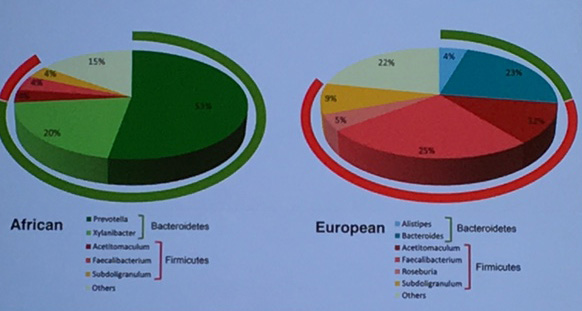 Pie charts showing the difference in gut bacteria between Africans and Europeans. Of interest is the fact that Firmicutes have been associated with weight gain and obesity.
Pie charts showing the difference in gut bacteria between Africans and Europeans. Of interest is the fact that Firmicutes have been associated with weight gain and obesity.
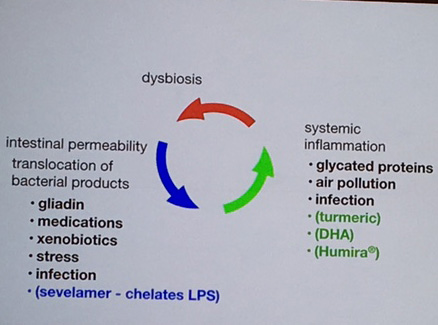 Illustration showing the association between common challenges in the modern world with gut disturbance and subsequent systemic inflammation that in turn hurts our brains.
Illustration showing the association between common challenges in the modern world with gut disturbance and subsequent systemic inflammation that in turn hurts our brains.
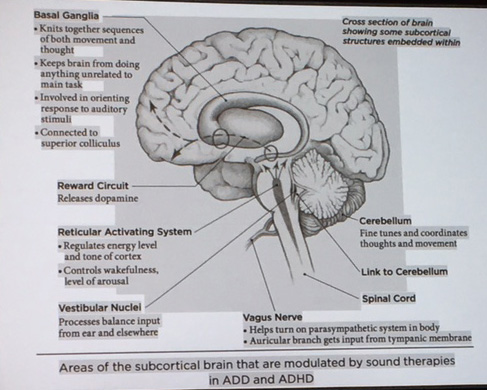 The evidence for the amazing healing qualities of music was very compelling throughout the conference.
The evidence for the amazing healing qualities of music was very compelling throughout the conference.

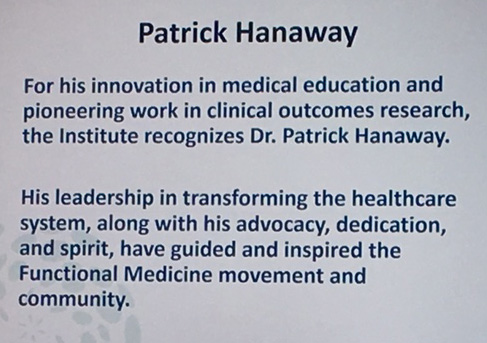 Dr Patrick Hanaway - one of the founding members of the Cleveland Medical Centre
Dr Patrick Hanaway - one of the founding members of the Cleveland Medical Centre
and winner of the 2017 Linus Pauling award
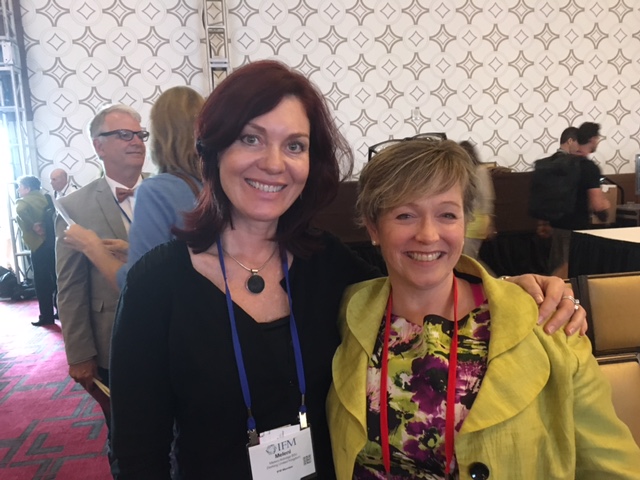 Meleni Aldridge, ANH excecutive coordinator with Annie Hopper — Dynamic Neural Retraining System
Meleni Aldridge, ANH excecutive coordinator with Annie Hopper — Dynamic Neural Retraining System
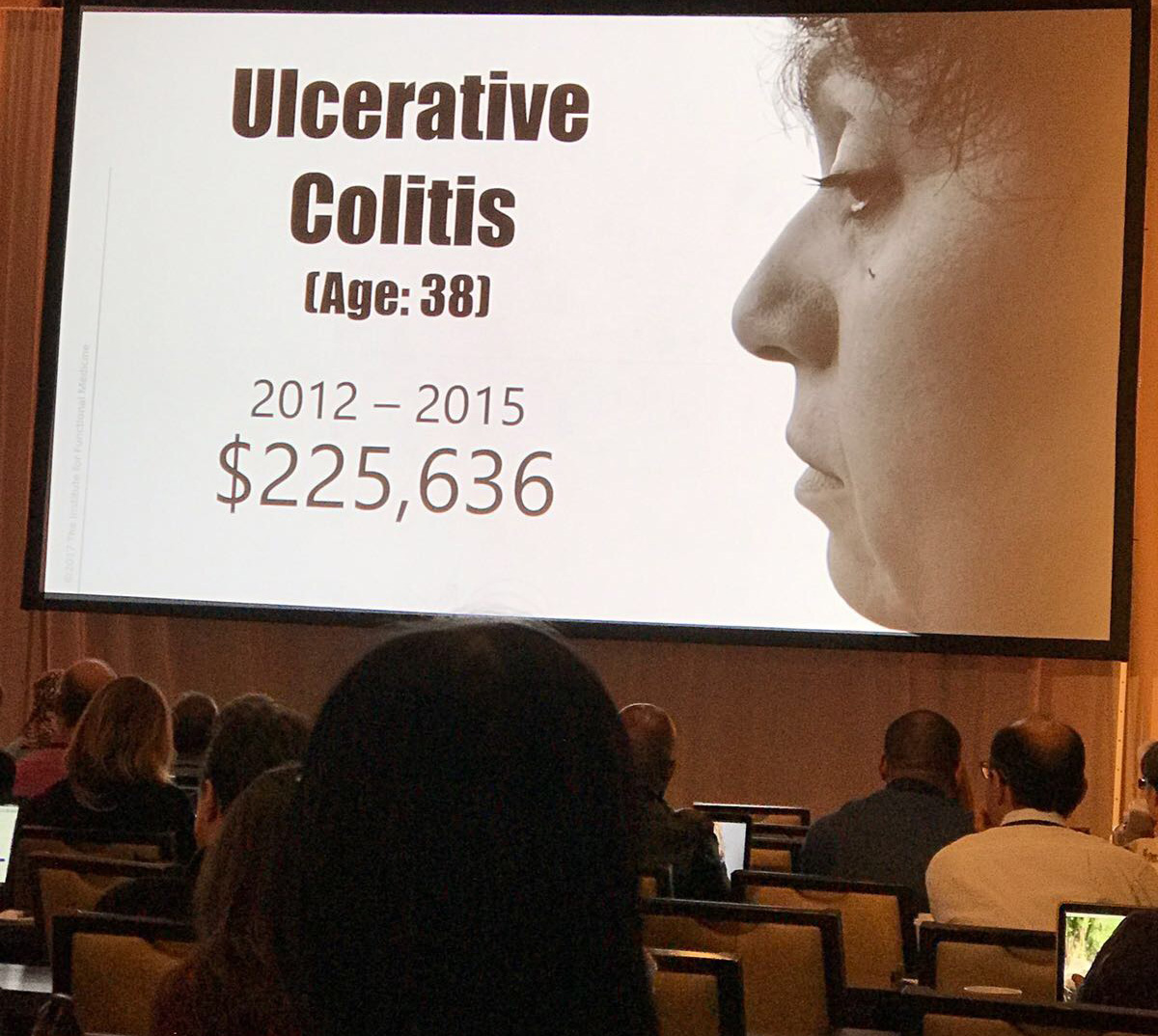 The conventional medical spend by one patient on her chronic condition in two years. A condition where many cases are can be largely prevented and resolved with diet and lifestyle medicine.
The conventional medical spend by one patient on her chronic condition in two years. A condition where many cases are can be largely prevented and resolved with diet and lifestyle medicine.





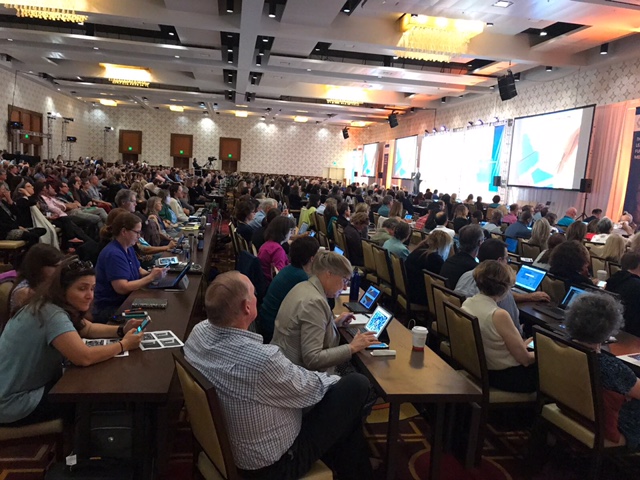




Comments
your voice counts
07 June 2017 at 11:42 pm
Really enjoyed your article Mel and the information is not only fascinating but something that, as a yoga and mindfulness teacher, I have inherently known for years. Physical exercise including yoga, high-intensity training as well as calming practices like meditation are freely available and can easily be done at home but increasing the health of your gut microbiome can be a difficult one for people. There is so much talk around about Pro and prebiotics, I would be interested in your opinion on how to actively increase this process in the digestive system eg: how do you feel about Kefir since it involves the use of dairy? Any other easy suggestions on this topic would be greatly appreciated. Best wishes, Kate x
09 June 2017 at 12:39 pm
Hi Kate
You're right, in this refined-carb laden world it is hard to cultivate a healthy gut microbiome. Your gut bacteria will thank you for cutting out gluten (http://anhinternational.org/2017/01/25/whats-big-deal-gluten/), sugar, refined carbs and limiting alcohol consumption, whilst increasing plant foods on a daily basis. It's not just about the phytonutrients in a rainbow diet, but also about the fibre that benefits the growth of the species most beneficial to us. Broccoli and celery stalks are brilliant for insoluble fibre, whilst apples are a great source of soluble fibre.
Prebiotic foods like Chinese turnip (jicama in the US), dandelion leaves, garlic, chicory and Jerusalem artichoke are useful too, but the latter can cause bloating and discomfort in some sensitive people so start with little amounts. Probiotic foods like kimchi, sauerkraut, live yoghurt (not if dairy intolerant), kefir and kombucha are really essential additions to the diet. Kefir can certainly be made with water and coconut milk for those that can't, or would rather not, take dairy. They require different starter grains, so just make sure you buy the ones for water or coconut milk.
All in all making sure you have sufficient, fresh, plant foods for fermentable fibres in your diet is the first step to cultivating a healthy gut microbiome. Nuts, particularly pistachios, blueberries and even dark chocolate (85%+) yield gut-nurturing polyphenols and fibre. Food is where we get most of our gut bacteria from, so diversity is essential. Probiotic supplements can be helpful to create a better environment for your gut bacteria, but they don't colonise, so don't rely on them to do all the work for you!
We could do an entire feature on this, but hopefully this will help in the meantime.
Best wishes
Meleni
14 June 2017 at 9:38 pm
Thanks Mel, great response and way more information than I expected. I grow my own Kefir and love it, didn't know you could get grains for Coconut milk that are different, so will check that out, thank you. Best wishes.
Your voice counts
We welcome your comments and are very interested in your point of view, but we ask that you keep them relevant to the article, that they be civil and without commercial links. All comments are moderated prior to being published. We reserve the right to edit or not publish comments that we consider abusive or offensive.
There is extra content here from a third party provider. You will be unable to see this content unless you agree to allow Content Cookies. Cookie Preferences